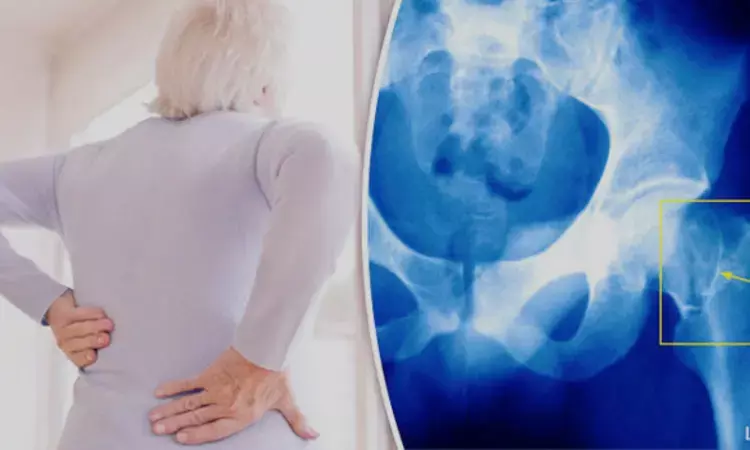- Home
- Medical news & Guidelines
- Anesthesiology
- Cardiology and CTVS
- Critical Care
- Dentistry
- Dermatology
- Diabetes and Endocrinology
- ENT
- Gastroenterology
- Medicine
- Nephrology
- Neurology
- Obstretics-Gynaecology
- Oncology
- Ophthalmology
- Orthopaedics
- Pediatrics-Neonatology
- Psychiatry
- Pulmonology
- Radiology
- Surgery
- Urology
- Laboratory Medicine
- Diet
- Nursing
- Paramedical
- Physiotherapy
- Health news
- Fact Check
- Bone Health Fact Check
- Brain Health Fact Check
- Cancer Related Fact Check
- Child Care Fact Check
- Dental and oral health fact check
- Diabetes and metabolic health fact check
- Diet and Nutrition Fact Check
- Eye and ENT Care Fact Check
- Fitness fact check
- Gut health fact check
- Heart health fact check
- Kidney health fact check
- Medical education fact check
- Men's health fact check
- Respiratory fact check
- Skin and hair care fact check
- Vaccine and Immunization fact check
- Women's health fact check
- AYUSH
- State News
- Andaman and Nicobar Islands
- Andhra Pradesh
- Arunachal Pradesh
- Assam
- Bihar
- Chandigarh
- Chattisgarh
- Dadra and Nagar Haveli
- Daman and Diu
- Delhi
- Goa
- Gujarat
- Haryana
- Himachal Pradesh
- Jammu & Kashmir
- Jharkhand
- Karnataka
- Kerala
- Ladakh
- Lakshadweep
- Madhya Pradesh
- Maharashtra
- Manipur
- Meghalaya
- Mizoram
- Nagaland
- Odisha
- Puducherry
- Punjab
- Rajasthan
- Sikkim
- Tamil Nadu
- Telangana
- Tripura
- Uttar Pradesh
- Uttrakhand
- West Bengal
- Medical Education
- Industry
Study Links Gabapentinoid Use to Increased Hip Fracture Risk, Particularly in Frail and CKD Patients

Australia: In a recent case-case-time-control study of Australian residents hospitalized for hip fractures, the use of gabapentinoids (gabapentin and pregabalin) was linked to an increased risk of hip fractures, particularly among patients who were frail or had chronic kidney disease (CKD).
The findings, published in JAMA Network Open, indicate that, alongside the known risks linked to kidney impairment, gabapentinoids should be prescribed with caution in patients at higher risk of hip fractures, particularly those who are frail.
Gabapentinoids, which include drugs like gabapentin and pregabalin, are widely used to treat conditions such as neuropathic pain, fibromyalgia, and seizure disorders. While effective for these purposes, previous studies have hinted at side effects like dizziness, drowsiness, and impaired coordination. These side effects can lead to an increased risk of falls, but the connection to hip fractures has not been thoroughly explored until now.
Against the above background, Miriam T. Y. Leung, Centre for Medicine Use and Safety, Faculty of Pharmacy and Pharmaceutical Sciences, Monash University, Melbourne, Australia, and colleagues aimed to examine the overall relationship between gabapentinoid use and the risk of hip fractures, and how this association varies across different age groups, frailty levels, and histories of chronic kidney disease.
For this purpose, the researchers conducted a case-case-time-control study involving patients hospitalized for hip fractures in Victoria, Australia, between March 2013 and June 2018, who had at least one prescription for a gabapentinoid before the fracture. They used conditional logistic regression to estimate the odds ratio for gabapentinoid use during the 1-60 days before the fracture compared to 121-180 days prior.
Each case was matched with up to five controls based on age and sex. Subgroup analyses were conducted based on CKD, frailty status, and frailty scores. Data analysis was performed between November 2023 and April 2024.
The study led to the following findings:
- Of the 28,293 patients hospitalized for hip fractures, 10.4% had been dispensed with a gabapentinoid before the fracture.
- Among those, 59.5% were aged 80 or older, and 71.2% were female.
- Gabapentinoid use was associated with nearly double the odds of hip fractures (OR 1.96).
- The odds remained elevated (OR 1.30) after adjusting for exposure-time trends and using other central nervous system medications.
- The association was stronger in patients with frailty scores of 5 or higher (OR 1.75) and those with chronic kidney disease (OR 2.41).
"The findings showed that in Australian adults hospitalized for a first hip fracture, the use of gabapentinoids was linked to an increased risk of hip fractures, particularly in frail patients or those with chronic kidney disease. Alongside the established risk associated with kidney impairment, frailty status may also be a significant factor to consider when prescribing gabapentinoids," the researchers concluded.
Reference:
Leung MTY, Turner JP, Marquina C, et al. Gabapentinoids and Risk of Hip Fracture. JAMA Netw Open. 2024;7(11):e2444488. doi:10.1001/jamanetworkopen.2024.44488
Dr Kamal Kant Kohli-MBBS, DTCD- a chest specialist with more than 30 years of practice and a flair for writing clinical articles, Dr Kamal Kant Kohli joined Medical Dialogues as a Chief Editor of Medical News. Besides writing articles, as an editor, he proofreads and verifies all the medical content published on Medical Dialogues including those coming from journals, studies,medical conferences,guidelines etc. Email: drkohli@medicaldialogues.in. Contact no. 011-43720751


